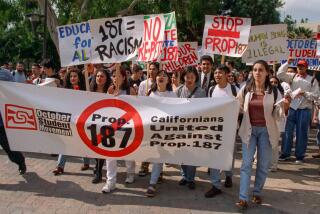The Misuse of Mediation
- Share via
It used to be that politicians faced with difficult decisions and competing constituencies suggested that a committee be formed. Now they suggest mediation. Sounds reasonable. After all, sensible people always want to attempt compromise if it will avoid lengthy and costly litigation. And mediation can work quite well in the political arena.
But whoever suggested to Gov. Gray Davis that he mediate the constitutionality of Proposition 187 badly misunderstands mediation’s role in our democracy and in dispute resolution. And if the mediation goes forward, both constitutional law and mediation are at risk. Here’s why.
California law defines mediation as “a process in which a neutral person facilitates communication and negotiations between disputants to assist them in reaching a mutually acceptable agreement.” The law protects the confidentiality of what is said during mediation so parties can be honest about the terms on which they are willing to settle, without fearing that the other side will later use their words against them in court.
Mediation is generally a process used by parties who are not seeking to establish the boundaries of the law or constitution. It works extraordinarily well when a dispute over a job, a contract or a transaction can be resolved by money, property, apologies or enforceable promises. It prevents or ends costly litigation, it saves court resources, and it can resolve disputes in ways that are not possible through the win/lose mechanism of litigation. But mediation is not a substitute for the courts in every case. When matters of deepest principle--constitutional values--are truly in question, the courts are the only proper forum.
Think of Brown vs. Board of Education. Would we have been better off as a democracy if the constitutional principles had been settled through compromise by the parties? Would three-fifths of African American children have been entitled to equal educational opportunity, or would only African American children in certain states have a right to the same education as white children? Both compromises have a historical basis, and both compromises would have made for terrible constitutional principles. Yet, if the litigants and groups who filed “friend of the court” briefs had mediated the case, reached a settlement and withdrawn it from consideration by the Supreme Court, one of those principles might be the law today.
Mediating the constitutionality of Proposition 187 might be worse. Since there are no “friend of the court” briefs, the opportunity for interested groups to participate is badly diminished. And since the parties would dismiss the case after mediating a compromise, neither the U.S. 9th Circuit Court of Appeals nor the U. S. Supreme Court--the final judge of constitutionality--would get a chance to interpret the Constitution. Instead, the parties to this lawsuit could force us all to live with their private compromise.
Mediation as a dispute resolution process that avoids or ends lawsuits also would be seriously damaged. Many people would find it hard to participate in a process that is tarnished by it having been used to circumvent the constitutional constraints on initiatives. Special-interest groups might be encouraged to challenge the constitutionality of laws they did not like, even if they thought there was no chance of having them declared unconstitutional. Finally, if what went on in the confidential mediation sessions was “leaked” to give an appearance of openness, fewer parties would feel confident about speaking honestly and fewer settlements would come out of mediation.
California law leads the nation in protecting the confidentiality of mediation. Those protections could be compromised by attempting to mediate this difficult constitutional issue, whicht belongs in the courts.
More to Read
Get the L.A. Times Politics newsletter
Deeply reported insights into legislation, politics and policy from Sacramento, Washington and beyond. In your inbox three times per week.
You may occasionally receive promotional content from the Los Angeles Times.










